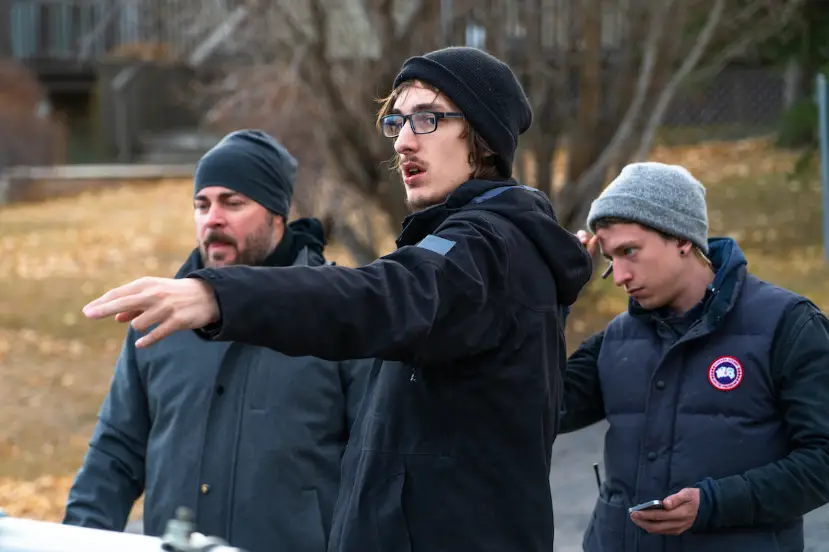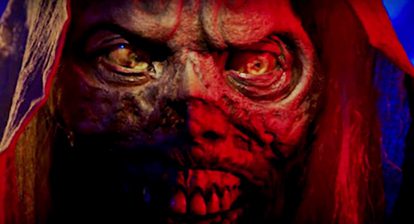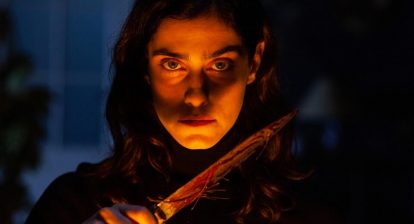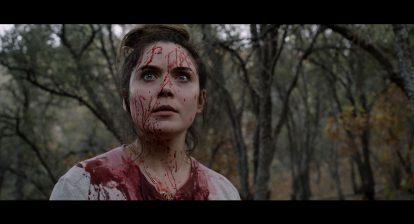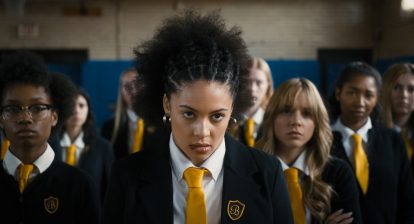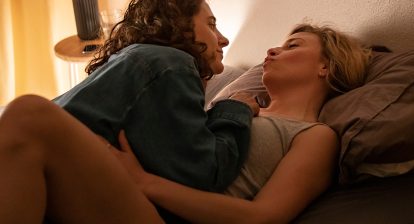Canadian filmmaker Kurtis David Harder has had a hand in some of the most well-received horror movies of the last few years, producing the likes of Harpoon, What Keeps You Alive, and Z. Harder is also a blossoming director in his own right, having helmed the super-strange Cody Fitz in 2011 followed by heady sci-fi movie InControl in 2017. With his latest directorial effort, however, Harder marks himself out as one of the most fascinating and inventive voices working in horror today.
Written by Colin Minihan John Poliquin, Spiral follows a gay couple in the nineties who move to suburbia only to be targeted by what appears to be a neighbourhood cult. While Jeffey Bowyer-Chapman’s Malik immediately spies something is up, his well-meaning husband (played by IT star Ari Cohen) thinks it’s all paranoia following years of horrific homophobic abuse. Wicked Horror caught up with Harder to discuss the film’s queasy relevancy in 2020, the difficulty of sourcing the perfect nineties-style property in snowy Calgary, and plenty more besides.
WICKED HORROR: First, let me just say, as a queer horror fan, Spiral is such a major moment for us, I just loved it so much. I saw it for the first time over a year ago and haven’t stopped thinking about it since. How did you originally get involved with this project, how was it brought to you?
KURT HARDER: Colin Minihan and I had worked on a bunch of movies together, What Keeps You Alive, Z, he’d written an early draft of the script and we’d kind of talked about me doing a horror project with him, ‘cause I’d never directed a horror movie before. He and John Poliquin wrote this script and we’re kind of like a collective of filmmakers, we produce for each other all the time, so that’s kind of how it fell into place. We’d been doing a bunch of films together and then they had this script, they felt like I’d be a good fit for the project, and it just went from there.
WICKED HORROR: This seems like a dumb question, considering how powerful this movie is, but what was it that first attracted you to the script?
KURTIS DAVID HARDER: I really like the psychological horror, going into the mind, exploring the descent into madness, and exploring what’s real and what’s not real. Playing with those kind of expectations – is there actually a cult going on or is it all in Malik’s mind? I love that kind of dynamic, it’s kind of like Jacob’s Ladder.
Related: Spiral [Frightfest 2019 Review]
WICKED HORROR: You don’t really know right up until the end, actually. Even me, I just watched it again and I was questioning whether it was real or not.
KURTIS DAVID HARDER: Right, what is real, what is actually happening? Because obviously Malik is going through something, he’s dealing with this past trauma, but without spoiling anything, something definitely is happening. But we do play with whether some of that stuff might be in Malik’s head, too.
WICKED HORROR: It’s interesting to see a man in the position of being gaslighted. Usually it’s a female character being told “no, you’re crazy, it’s all in your head.” But Malik is literally told at one point that he has to stop acting like everybody is out to get him all the time.
KURTIS DAVID HARDER: Exactly, and I think that Aaron [Ari Cohen, who plays his husband] comes from a place where he doesn’t really have that shared history, because he’s obviously lived a straight life for a long time. He’s coming at it from the perspective of “we need this to be good for us” but Malik is seeing through the cracks.

WICKED HORROR: These three actors at the heart of the movie, Jeffrey Bowyer-Chapman, Ari Cohen, and Lochlyn Munro, they give three completely different but equally strong performances. How did you guys go about filling those roles? Did you have any of them in mind from the outset?
KURTIS DAVID HARDER: Jeffrey was a good friend of John Poliquin’s and he was the first one to suggest that Malik should be a Black character actually, because it wasn’t written with an ethnicity in mind, we were casting with a broad scope. He read it, really liked it, and then it just sort of fell into place really quickly. Jeffrey joined the project pretty quickly. Ari was through a mutual friend, we were all fans of his work. And then Lochlyn Munro was through our casting director.
WICKED HORROR: Lochlyn Munro is an interesting choice, too, because he’s just had this massive resurgence on Riverdale, playing a serial killer. So as soon as he showed up, it’s like “uh oh, he’s probably the bad guy.”
KURTIS DAVID HARDER: It’s funny to think about his history. He’s such a powerful actor, and I was such a massive fan of Dead Man on Campus. This is just the polar opposite role for him, so it was cool to see him play that.
WICKED HORROR: I remember him even in Scary Movie, back in the day. Seeing his trajectory from then to now is pretty cool, but I guess younger people will know him from Riverdale and watching him in this is going to be a big shock to them.
KURTIS DAVID HARDER: Totally, yeah.
WICKED HORROR: What about the location? The main house is amazing. Is that actually a small town or has it just been cleverly shot to look that way, because it’s totally convincing.
KURTIS DAVID HARDER: That house is outside of Calgary. It was an empty house for sale, we’d been scouting all over the place trying to find – because the movie takes place on a street, and we focus on three different houses for the majority of the film – we really tried to find a street that would work but being that it is 2020 it’s hard to find three houses built together that all still look like they’re in the nineties. So all three of those houses were actually really far apart, we had to do a lot of camera trickery to make it seem like they were across from each other, but the main house was on the market, we found it, we set dressed the whole thing. It was an empty house. We brought everything in, which really worked in our favour because it meant we were really able to deck it out for the nineties. We could choose everything without having to work around a house that’s full of stuff. It was on the outskirts, near this lake, but we definitely manufactured that town, the town was made up of a bunch of different locations around Calgary, all around the outskirts.
WICKED HORROR: It’s funny, because I just watched another Canadian horror movie called Anything for Jackson, which had a similar kind of snowy, small-town vibe to it but I wonder if that was similar trickery. We think of Canada as this big expanse so it’s easy to make these locations feel more isolated than they actually are.
KURTIS DAVID HARDER: We did shoot in one small town, an actual small town, just outside of Calgary for the street but the main house is in Cochrane, which isn’t actually that small a town.

WICKED HORROR: Was that the biggest hurdle with the shoot?
KURTIS DAVID HARDER: That was definitely huge, because you’re trying to fit the time period. We definitely spent a good amount of time knocking on doors trying to find the right house to fit the different pieces of the movie, because the script has a lot of very specific sections of the house. It’s kind of a character in itself too.
WICKED HORROR: Was the story always set in the nineties?
KURTIS DAVID HARDER: Yes. I think the nineties really set the scene for the gay movement of the time. That was a big moment. It also fit with the theme of the movie, looking for the victim of the time, and the gay rights movement and the AIDS epidemic. It fit the time period in that sense too. Even though it feels like the movie is more relevant now.
WICKED HORROR: Even watching it a year later, it felt like a completely different film, you know? Because we’re in a completely different spot now than we were even last year.
KURTIS DAVID HARDER: We shot the movie in 2018. BLM was a movement and the divide between the left and the right was obviously a hot topic but it’s just crazy how much more relevant the movie is in 2020 than it was before.
WICKED HORROR: It’s a great time to have a Black lead, definitely.
KURTIS DAVID HARDER: Totally. The bigotry aspect, even the gay aspect too, it all feels even more relevant now.
See Also: Frightfest 2017 Review: Incontrol
WICKED HORROR: There’s been such a push for more queer representation in horror, more POC in horror. So it’s great that Spiral tackles both of those head on. It’ll definitely stand the test of time in that way. Though, hopefully, in ten years’ time these won’t still be topics of conversation.
KURTIS DAVID HARDER: It feels weird to say it, but yeah, I hope this movie is irrelevant soon!
WICKED HORROR: Looking at your filmography in general, the idea of identity is one you seem to be drawn to over and over in your work. Would you say that’s fair?
KURTIS DAVID HARDER: Yeah. I love exploring what makes us tick and who we are, and why we do the things we do. I think that comes up in all my movies. It’s one of the more fascinating things that I lean towards, what makes you, you and why you are the way that you are. Those outside influences are looking at how we solve problems as a society and how we deal with issues. This one fit into all that, looking into the mind of Malik and his past trauma and how that influences him now, and then pairing that with outside threats.
WICKED HORROR: The scarier stuff, for you, is rooted in the everyday stuff, the reality rather than the supernatural?
KURTIS DAVID HARDER: Absolutely. I think looking at yourself can be scary sometimes. Someone running at you with an axe is obviously scary but I personally think it’s way more scary to explore the mind.
Catch Spiral streaming on Shudder now
** This interview has been edited for length and clarity.
